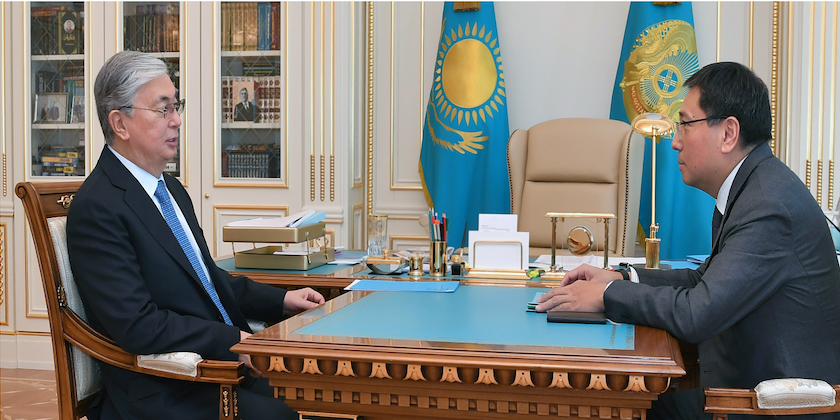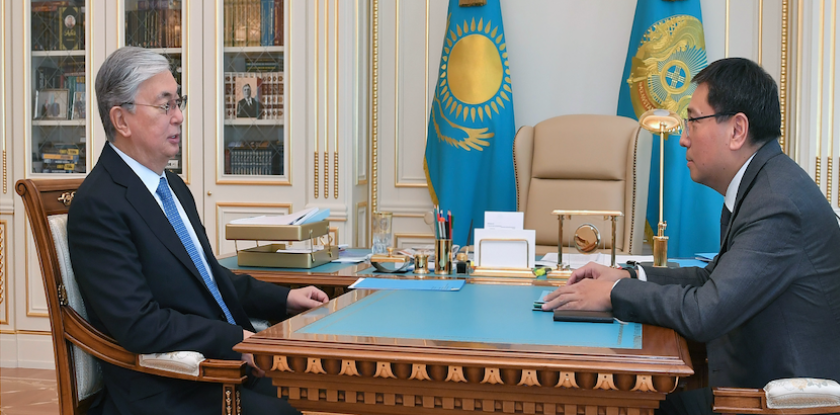The situation on the world financial market remains difficult albeit the US dollar continues to strengthen. Not a single currency is able to withstand this process including the euro and the British pound not to mention the Russian ruble and tenge. With that, the Central Bank of Russia chose not to revise the base rate. As oppose to the National Bank of Kazakhstan that did so as early as March 10.
The Kazakh authorities are taking the urgent measures to stabilize the national economy and to prevent the socio-economic crisis in the country. This, among other things, is a evident from the numerous official announcements such as «The Government Has Approved the Package of the Anti-Crisis Measures» or «The Government Has Examined the Preparations for the Spring Sowing Campaign». And such news appear every day in abundance.
This kind of flurry of activity shows that Akorda, the Government, the National Bank of Kazakhstan and other state agencies are trying to do everything in their power to preserve the level of life of the Kazakh population. Nonetheless, they have little chance to succeed due to the four following reasons:
1) the drop of the world oil prices;
2) the constriction and termination of the previous commercial ties due to the coronavirus pandemics and the world-wide introduction of the state of emergency as well as the restrictions of people’s, transport’s and cargo’s movements;
3) the devaluation of the national currency;
4) the raise of the base rate by the National Bank of Kazakhstan.
In our opinion, even one of the four mentioned reasons is enough for the Kazakh economy that is highly integrated into the global economy to suffer a serious damage whose size and consequences can only be assessed after the fact and no sooner than in several years.
However, if the drop of the oil prices, the constriction or termination of the previous commercial ties and the national currency devaluation may be regarded as the factors outside of Akorda and the Library’s control, then the raising of the base rate has certainly been approved by them.
In view of which, a legitimate question arises — why has this been done?
In order to try and answer it, let us quote the two latest National Bank’s press-releases devoted to the subject. Let us start with the document released on March 10, 2020, and titled «The Base Rate Is Raised to 12%» (text in bold hereinafter by kz.expert).
«The National Bank of Kazakhstan has made an unplanned decision regarding the base rate due to the need to maintain the price stability in the context of the negative affect of risks from the external sector.
From March 10, 2020 the base rate is set at the level of 12% per annum with the expansion of the corridor to +/- 1.5p.p. Consequently, the rate for the liquidity provision standing facilities amounts to 13,5% and for the liquidity withdrawal standing facilities — 10,5%.
The decision on increasing the base rate was made as the response to the sharp change of the situation in the world economy. Significant geographical expansion of coronavirus COVID-19 has become the main factor of deterioration of the economic development prospects of countries — main consumers of Kazakhstan’s export such as China and European Union.
On March 9, 2020 Brent oil price decreased dramatically due to the disagreement of the participants of OPEC+ meeting on the terms of cutting the oil production. Its price situated in the range of 31-36.5 US dollars per barrel with the maximum decrease by more than 30% throughout the day.
The monetary policy of the NBK, implemented in the framework of inflation targeting, is aimed to prevent the transmission of the external shock to the national economy and to ensure the macroeconomic stability and the protection of tenge assets».
The press-release of March 16, 2020, titled «On Maintaining the Base Rate at 12,0% and Adapting the Domestic Market to the New Macroeconomic Realities» informs on the following.
«The National Bank of Kazakhstan has made a decision to maintain the base rate and the interest rate corridor at 12% per annum +/- 1.5 percentage points.
In the conditions of uncertainty in the external sector and realization of risks related to the expansion of coronavirus COVID-19, the consequences of trade wars, the increase of geopolitical tensions, according to the estimates of the international institutions and experts the significant and persistent economic growth slowdown is expected. The growth rate of global GDP in 2020 can be the worst since the world financial crisis in 2008.
Since the beginning of the last week the significant volatility in the world commodity and financial markets is being observed. The dynamics of oil price is getting formed under the influence of the events caused by the disagreement of the participants of OPEC+ meeting and the unfolding price war between Russia and Saudi Arabia. From March 9, 2020 Brent oil price has fixed in the range of 31- 36.5 US dollars per barrel. In the morning of March 16, 2020 it amounted to 32.8 US dollars per barrel.
As the result of investors’ negative expectations the world stock market indices have demonstrated the most dramatic drop in the past 30 years. Last week the US Fed announced short term liquidity provision in the amount of 1.5 billion of US dollars and yesterday on an emergency basis reduced the key interest rate to 0-0.25% and announced the launching of the new quantitative easing program in the amount of 700 billion of US dollars. The depreciation of the developing and oil exporting countries’ national currencies was observed.
Under these conditions in order to maintain the price stability the National Bank of Kazakhstan has taken a number of prompt and proactive measures during the period from March 10 to March 13.
The decision made on March 10, 2020 to increase the base rate to the level of 12% has provided a preventive effect to the spread of panic in the market and has timely adjusted the strategies of the market agents, thus allowing to reduce the emerging inflationary risks and protect the tenge assets.
At the same time, the expansion of the interest rate corridor to 1.5 pp was intended to reduce the possibility of speculative pressures on exchange rate by the market participants, increasing the cost of tenge borrowing by the banks from the National Bank of Kazakhstan to 13,5%. The National Bank of Kazakhstan on the daily basis provides liquidity to banks without the amount limitations».
In our opinion, the quoted passages clearly show that the National Bank of Kazakhstan continues its previous policy aimed to stabilize the prices and tariffs. Meanwhile, this task has currently faded into insignificance for now the goal is to adapt the national economy to the new conditions and rules of the global game (at the very least) or to perhaps even ensure its very survival. Even though it is obvious that, due to its patriarchal way of life, Kazakhstan is not going to end up one of the main victims of the current crisis, it is still going to experience tough times. Simply because the world has started the redivision of everything that can be divided, changed or rebuilt on this earth.
Amid all this, the question of whether Akorda will be able to mobilize (apart from the other state agencies and the rest of the country) the National Bank and its head Erbolat Dossayev is turning to be the crucial one. Judging by the way the meeting between President Kossym-Jomart Tokayev and this official is described, so far, these men have been lacking understanding with one another.

Let us quote Akorda’s press-release of March 11, 2020, called «Kossym-Jomart Tokayev Has Met With Chairman of the National Bank Erbolat Dossayev» that is unique in its brevity and consists of two lines only.
«The Head of the State has been informed on the current situation on the financial market and on the measures taken to ensure the macroeconomic stability in the country».
In our opinion, all the measures that are now being employed in the country cannot altogether compensate for the damage inflicted on the Kazakh economy by the raise of the base rate from 9,25% to 12% and the expansion of the interest rate corridor from 1% to 1,5%. Of course, we quite allow for the possibility that, at the time this decision was made, the National Bank was correct in choosing to make it since, at that time, its task was to prevent the devaluation of the national currency and the jump of retail prices and tariffs. However, the former has already happened and the latter will be happening slowly and continuously.
We believe the National Bank of Kazakhstan must join the national banks of other countries and, if not decrease the base rate to the level lower than the pre-March 10 rate, then at least go back to the latter. In order to help the national business not in the word but in the deed.
But will our expectation come true?




